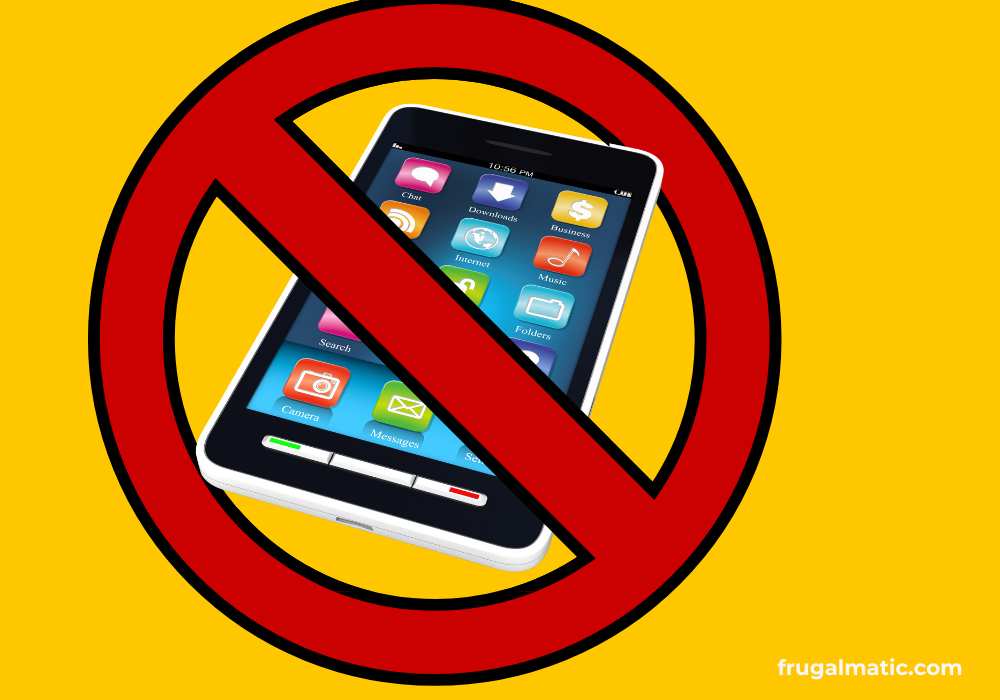This post was last updated on March 29th, 2025 at 10:32 am
Where can you spend nearly one hour of your time with a large group of people and have nobody in the room check their phone? Not a gym. Not a grocery store. Certainly not a restaurant. Try a place of worship. In the past few years, I’ve treated my own church as a sanctuary of sorts, where I can spend an hour or more without having to witness anyone pulling out a device. In this space, being on a phone is still taboo. It is, I dare say, a small miracle.
A few years ago, I would have said it’s also taboo to use a phone during a movie at a theater. But that’s less true today, and many moviegoers have complained about teens, especially, taking selfies and posting to social media during movies. Rude phone behavior became more noticeable after COVID, arguably taking off with the release of “Barbie” in 2023.
Of course, using a smartphone is still frowned upon in certain private settings. Many schools now ban them because they damage the learning environment. Some employers prohibit their use during working hours. Many families have strict phone rules, too. But as far as public spaces are concerned, there’s really no place you can go to escape the scrolling habit… except religious settings.
Refusing to feed our digital obsessions
I am not one to evangelize. (You will find only one other post on this website mentioning religion, an interview with John Cuddeback). At the same time, I haven’t read any articles or essays highlighting how churches and other places of worship have become the last places where you’re expected to keep your phone in your pocket. If no one else will, then I’ll applaud these institutions for refusing to feed our digital obsessions.
To be clear, I have actually witnessed some bad phone behavior at church, though the worst offenses have been mostly limited to Christmas and Easter services when many people who aren’t regular churchgoers are in attendance. However, during ordinary times, the regulars largely keep their phones in their pockets, including during those minutes while seated and waiting for the service to begin. To have a large group of people simply sit without pulling out a phone is truly remarkable. Where else would this happen?
Actually, one of my greatest fears is my phone suddenly ringing in the middle of a service. I find myself checking multiple time to make sure I’ve silenced my phone. To be honest, I often turn off my phone to avoid any possibility of embarrassment. It’s no fun when you’re that person scrambling to turn off your phone before it rings a second time. Yikes! It feels like the whole congregation is staring at you, and most of them are, for at least a moment.
Why phones and worship don’t mix
I am thankful a ringing phone during church remains a big no-no. Imagine, for a moment, if answering a phone during worship services suddenly became OK. Such a development could mean the end of public worship as we know it. If people began to openly check their phones and allow them to buzz and ring during services, what would be the point of worshiping? The whole purpose of attending services would be defeated, or nearly defeated. You’re either in a “worship mode” or you’re not. There’s no such thing as multitasking at church (unless you have small children and are trying to manage them and still pay attention to the service. More on that later.)
Indeed, the problem with using a phone during worship services goes beyond the distraction issue. Arguably, the bigger problem is that these devices have evolved into our preferred tool for experiencing consumerism. In terms of Christian culture, mindless consumerism has always been an enemy of spiritual development. The pursuit of “worldly possessions,” as the Bible describes it, is a well-known barrier separating us from God. Using social media, checking game scores, visiting news sites, and peeking at email are all examples of consumerism. Places of worship have repelled such behavior perhaps because religious leaders inherently recognize it as not merely distracting but offensive to worship itself.
The real reason for church attendance declines?
My prediction is that the gulf between worship culture and technological culture will further widen as technology advances and becomes more addictive. Increasing numbers of people will likely struggle to separate themselves from technology, not because it helps them do their jobs or carry out everyday tasks. Rather, more people will become outright addicted, creating a world that resembles the one depicted in the novel “Nirvana Effect.”
The book’s author, Brian Pinkerton, imagined a future in which people experience virtual reality through implanted microchips. In this world, severe addiction to virtual reality becomes widespread, and entire tent communities of addicts pop up. Marriages are destroyed, and a huge chunk of the population completely separates from the physical world. Those who refuse to receive the implants, which the government pays for, become renegades. They have what you and I would consider normal lives, but, in this dystopian future, they become outcasts for being the only people without implants.
In some ways, a milder version of this future has already arrived. There has been a lot of speculation about why church attendance has declined. Everything from the COVID pandemic to busier schedules has been blamed. But in my opinion, one big reason for the decline is that many people simply cannot tolerate spending time in an environment that cuts them off from their devices—not even for one hour. Many people’s digital addictions have led them down a path that, whether they realize it or not, demand that they remain in a setting that allows them instant and unencumbered access to their devices.

The rituals that our digital culture rejects
For those people who spend many hours each day on their devices, the church experience may feel like a total mismatch. Not only do people attending church refrain from using their phones, they’re also engaging in rituals that cannot happen in a digital setting. Singing in public is a good example. Years ago, before the television’s arrival, people gathered to sing as a form of regular entertainment. But who does that anymore, except to record themselves and post it to social media? To sing as a community without the intention of posting the act to social media is practically unheard of.
Just the fact that church involves friends, acquaintances, and strangers gathering together runs counter to digital culture. In fact, social media can have the perverse effect of isolating people and making them lonelier, as some studies have concluded. On the flip side, places of worship demand that we NOT isolate ourselves. They demand that we come together and do the exact opposite of what social media would have us do.
Finally, let’s talk about children. Different places of worship include children differently. Some places of worship have them spend the entire service alongside adults. In this setup, small children can start to feel bored and a little restless. In many situations like this, you’d expect parents to give their child a device to distract them. But you don’t see this at many worship services. Parents typically must find other ways to manage their kids, who themselves must learn how to cope without resorting to a screen for entertainment. It’s actually refreshing, though admittedly difficult at times for the parents.
As a parent myself, I’ve been there. I know what it was like to try to keep a little child from crawling under the pews. For the most part, the rest of the congregation was supportive. They want to see more families attend services because they know children are the future of worship. For these kids, worship services are an important lesson in experiencing life without being tethered to a device.
Church as a means to reduce screen time
Attending a place of worship is good for our spiritual development. It’s also a pretty good way to begin to cut back on phone use. If you have a bad habit of spending hours and hours on your devices every day, why not try attending a worship service? It might feel uncomfortable to not look at that phone for a full hour, but you’ll be around others who may be feeling the same way. Yet they somehow collectively resist, at least until the end of the service.
And who knows? Maybe the more time you spend at worship services, the less time you’ll spend on your phone even when you’re not at church.

